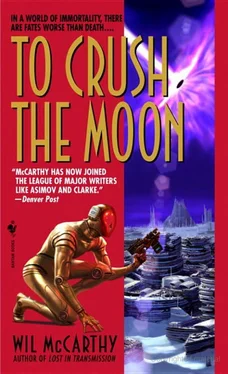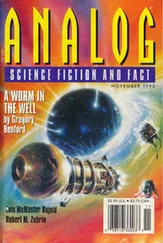“I will,” says Natan. “I do. Life is a precious gift.”
Still wiping his tears, Bruno chuckles at that. “An odd sentiment—don’t you think?—for an elite soldier in a sorely endangered country. Shouldn’t you be a Stoic?”
“Uh? I don’t know that word.”
“Er, silent. Economical in word and motion. Quietly suffering, to the point of simplemindedness.”
“Ah.” It’s Natan’s turn to chuckle. “We have no need of that, sir. That warrior mysticism, that claptrap. We don’t have to be that sterile. We have the blindsight training.”
Suddenly the wicker deck is creaking under bootsteps, and Radmer is there. “Ako’i?”
“I’m fine,” Bruno assures him, to forestall any involved discussion. The concern in Radmer’s voice is far less friendly, for Radmer’s duty is not to a person or an ideal, but to the human race generally. It’s a heavy burden, and admits little room for empathy or play. “Just reminiscing a bit.”
“That can be dangerous. Have you slept enough? Some of the men are tying down, over there on center-deck.”
“I’m not blind, Architect. I can see what’s happening five meters from my elbow.”
“Yes, well, you’ll need your rest for the climb. After we land, we’ll be ascending eight vertical kilometers in less than a hundred horizontally.”
“What’s our entry point?” asks Zuq, somewhere behind them all at the stern.
“Black Forest Pass,” Radmer answers, with such portentous foreboding that even Bruno, who’s never heard of the place, feels a shiver run through him at the prospect.
Chapter Seventeen
in which light fails
Bruno finds himself brushing a quantum horse—white with black spots, like a negative image of the wide, unforgiving cosmos. This creature, he knows, has the power to carry him anywhere he wants to go. The catch being, he first has to go everywhere , and then collapse his waveform to a single location. And that seems an odd bargain to strike; there’s a faint whiff of brimstone on the air. But there’s a destination he must reach, an error of judgment he must correct before… before…
But the flau jostles beneath him, and the wicker deck creaks, and he opens his eyes to darkness. The dream flees to wherever it is that dreams go, and is forgotten. Although he doesn’t know it, Bruno has had this dream five times before, and the warnings buried within it have been a great, if vague, source of trouble to his waking mind.
“Where are we?” he asks, sitting up abruptly. The coarse rope around his waist draws taut.
“Landing,” says Zuq, who sits beside him as a man might sit by a campfire. For warmth, for a kind of company. Along the railing that circles the flau’s broad back, every third post is triple-high, with a paper lantern lashed to a hook. The lamps have been lit with electric bulbs, and from this vantage Bruno can see there are similar lamps as well on the ground below. Landing lights.
And the stars are still up there in the sky, though the Murdered Earth clings low above the clouds which hide the western horizon, and the sea. But there is something ineffably dark about this place. The light doesn’t quite seem to reach the ground, or else reaches it but is not reflected back. Indeed, outside of the tiny islands of illumination underneath the airfield lights, he can’t see the ground at all. He has no idea whether they’re landing in a valley or on a mountaintop, although something in the angle of the breeze implies neither. On a shelf, halfway up a steep mountainside? To the east there’s nothing but blackness, and the voices of men, calling out landing instructions, echo as if from a canted, irregular wall.
“Where are we physically ?” he presses, frowning down at the knot that holds him. “The Sawtooth Mountains, obviously. But is this the pass?”
“Aye,” says Zuq. “The Black Forest herself. We’re about three and a half kilometers above sea level, on the Andrea Bench overlooking Aden. Due east of Timoch, give or take. The land rises eastward like a staircase.”
“I can’t see a thing,” says Bruno. His vision is still quite good—probably better than any of these “humans” can boast, but their trait of rapidly shifting skin pigment has made even Zuq into a shadow. It’s rather warm for a winter’s night in the high mountains, but dark skin will more readily absorb any ambient, radiant heat. In the cool and dark, these people, these humans, grow darker still.
“You’re not the only one,” answers Zuq. But he points to a faint glow, perhaps a hundred meters off the flau’s port side. “That’s Gillem Forta, the army base. Eight hundred men on station, and another fifty in semaphore shacks running all up and down the pass. Behind the main barracks there, you can just make out the highway.”
All Bruno can make out is the edge of a single building, and only because an electric lightbulb burns there in the gloom. There’s no road, no army base, no people at all except the airfield technicians, who are throwing ropes up to the waiting Dolceti under the disapproving glare of the steersman.
“You can’t see it from here,” Zuq continues, “but just the other side of the road is the Rayton Inn, where travelers catch their breath before the steepest part of the climb. Is it true blackberries come from the stars?”
“No, although they fared well in the soil of Planet Two, in the stormy skies of Barnard’s Star. They’re from Old Earth. Why do you ask?”
“Because the inn makes a fine blackberry pie, and an even finer blackberry beer, which they still call ‘the best in four worlds.’ I suppose they can call it whatever they like.”
“We’re not staying for pie,” says Radmer, walking up to them with a grim look. “Unless you want to reach the Stormlands at the height of morning thermals, when the gravel rains down, we must cross the pass summit by midnight, and the rim of Shanru Basin by the first light of dawn.”
“Black Forest at midnight,” Zuq marvels. “These are desperate times. I hope the road’s in good repair.”
“Parts of it,” Radmer says coolly. “But it can be done without roads at all. I once took a thousand men through this pass on a cloudy, Earthless night, without so much as a footpath to follow. In the other direction, the harder direction. And those were happy days, comparatively speaking.”
“The Davner War?” Zuq asks, marveling. He breaks into song for a moment: “ When the Endistal Faction broke the Gower Monop’ly? / And the rivers of freedom ran red! Are you that Radmer?”
“I’m older than I look,” Radmer says, deadpan. And Bruno laughs, because to a trained eye the remains of this architect laureate appear very old indeed. But he’s struck again by the span of time this Irish lad has crossed, the events he’s been caught up in. Never one to leave well enough alone. Surely not to abandon a world to its fate. Not again, not another one.
“The Endistas’ role in that story is underappreciated,” Radmer adds thoughtfully. “Kung’s army had nothing to eat but sugar, and I kept saying they had to crash sometime. But they led us a long, frantic chase, and if not for the harrying of those recon units we might not have caught them before they hit the flatland. I had an unusually good team with me.”
To which Captain Bordi answers, from somewhere nearby, “Way I hear it, Radmer, every team with you on it is an unusually good team. By coincidence, you’ll say, but I assume my grandfather had reason for idolizing you the way he did.”
With a smirk in his tone, Zuq says, “Maybe something else. That ballad isn’t all about fighting, you know.” He breaks into song again: “Radmer stayed with Queen Monday for eight years and twenty / and she bore him five sons and a girl!”
Читать дальше












